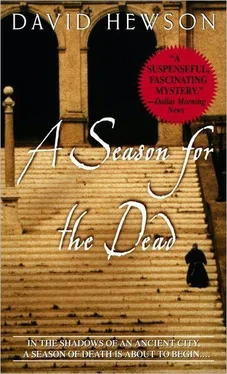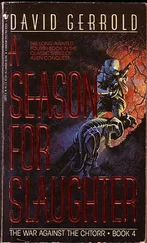David Hewson - A Season for the Dead
Здесь есть возможность читать онлайн «David Hewson - A Season for the Dead» весь текст электронной книги совершенно бесплатно (целиком полную версию без сокращений). В некоторых случаях можно слушать аудио, скачать через торрент в формате fb2 и присутствует краткое содержание. Жанр: Старинная литература, на английском языке. Описание произведения, (предисловие) а так же отзывы посетителей доступны на портале библиотеки ЛибКат.
- Название:A Season for the Dead
- Автор:
- Жанр:
- Год:неизвестен
- ISBN:нет данных
- Рейтинг книги:3 / 5. Голосов: 1
-
Избранное:Добавить в избранное
- Отзывы:
-
Ваша оценка:
- 60
- 1
- 2
- 3
- 4
- 5
A Season for the Dead: краткое содержание, описание и аннотация
Предлагаем к чтению аннотацию, описание, краткое содержание или предисловие (зависит от того, что написал сам автор книги «A Season for the Dead»). Если вы не нашли необходимую информацию о книге — напишите в комментариях, мы постараемся отыскать её.
A Season for the Dead — читать онлайн бесплатно полную книгу (весь текст) целиком
Ниже представлен текст книги, разбитый по страницам. Система сохранения места последней прочитанной страницы, позволяет с удобством читать онлайн бесплатно книгу «A Season for the Dead», без необходимости каждый раз заново искать на чём Вы остановились. Поставьте закладку, и сможете в любой момент перейти на страницу, на которой закончили чтение.
Интервал:
Закладка:
“What’s there to trade?”
“You tell me.”
“Nothing.”
To Gallo’s dismay he was rising to his feet. Jay Gallo tried to struggle to join him but his head hurt too much, his mind was just too woozy. “Hey,” he said, desperate for anything that could delay what was coming. “Why did you wait? Why?”
The strange face was cut in half by the moonlight. It was shocked, offended by the question. “You think I kill sleeping men?”
Gallo’s hands went up in front of him, two outstretched palms trying to ward off this big, black figure overhead.
“You think,” the man repeated, his voice beginning to rise, “I’d send you to glory without you knowing?”
“Don’t,” Jay Gallo whimpered. “I’ll do anything.”
The black figure nodded. “I know,” he said, calm once more.
The pale disk of the moon disappeared behind blackness. A stone-hard fist came down out of the high dark, punching. The meager light began to fade, began to be subsumed by blood and shattered bone.
He found himself moving, lifted by two strong arms above. Then there was some final relief: He fell into something cold, something that stank but woke him all the same. Jay Gallo choked on the stagnant water, wondering whether it made him feel better or worse. Then, under the unrelenting pressure of the hands that gripped his shoulders, his head went below the surface, his eyes stared into black nothingness.
The cold poison began to fill his lungs, no matter how much he struggled against the fists that held him down, how often he tried to vomit out the dank water. The chill left the dead river and raced into his mouth. Jay Gallo fought it for as long as he could, but at some stage the body needs to breathe even if there’s nothing out there to pass as oxygen. When he thought his lungs might break he coughed once, felt the coldness win some bitter victory in his chest, and then was still.
Sixteen
Five minutes after Teresa Lupo returned, Costa made his excuses.
Rossi had been right. There was a practical reason for the three of them to meet that evening. Nevertheless there was an unspoken one too, one in which he was an unwanted witness. Rossi and the woman were beginning to get too close for him to watch.
He drove through the thick Saturday night traffic, down brightly lit streets into the darkness at the edge of the city. It was a clear, starlit evening with a full moon. Even with the windows down, the interior of the old Fiat was uncomfortably hot.
The car swept around the illuminated hulk of the gate of San Sebastiano, out to the old Appian Way, traveled a mile down the narrow road and took the familiar turning to the house, following the rough drive until he parked beneath the vines of the car shelter that leaned drunkenly against the wall.
He stepped out of the car and breathed in the smell of the countryside: parched scrub and dust, with the distant fragrance of wild thyme somewhere underneath. Cicadas rattled in the dead grass at his feet. The black, darting outlines of bats, squeaking frantically, broke the perfect night sky.
The house was an old farmhouse in the dead land between the old Appian Way and the modern, busy thoroughfare of the Via Appia Nuova.
He remembered what he had said to Sara Farnese in front of the altar in the church on Tiber Island. A family was a team against the world, a bulwark against the insanity. He could not imagine what it would be like to be denied its sanctity. He could not begin to understand how anyone could survive the day without someplace like this, some safe, holy refuge in which joy and hope, fear and tragedy intermingled, became controllable through the mutual regard individuals felt for one another.
The light was still on in the front room. Marco Costa was asleep in an armchair. Pepe, the argumentative little terrier his father loved so much, lay at Marco’s feet, curled into a ball. Nic could remember the animal as a puppy, bought after his mother died, as if in compensation. He had been offended at the time, but his father had been right. The dog’s ceaseless need for love and attention, and his instant return of the same, made those dark months bearable. Now the years were taking their vengeance with the same vicious brutality, for both master and animal.
Giulia, his sister, had left a note in the kitchen, where the old man could not find it. She had to go to Milan on business for a week. There had been a call from their elder brother in Washington, young Marco. It was hardest for him. The busy lawyer’s life and the harsh working regime of America left little time for home visits. The slow process of dying was difficult enough to manage when one lived just a few miles from the old man; from the other side of the Atlantic it was impossible.
During the coming week, however, some routine could be maintained. Nic would stay during the evening whenever possible; Bea, Marco’s former secretary from his earliest days in politics, and still a firm friend, would come in for the daylight hours and any other time when work called Nic away. Giulia hated to leave him but she needed the time off too.
Nic read the rest of the note. The old man had taken his pills with his usual bad grace. His mood was up and down. The doctors said…
Her writing had faltered as she spelled out the words: perhaps weeks, not months now.
He closed his eyes and wanted to scream. His father was sixty-one, half a head taller than him, and once a bull of a man, someone who had, on occasion, stood up to the toughest of Turin union hoods and won his bloody way. Now he was some flimsy human husk, eaten away each day by this insidious, invisible disease. It was savagely unjust, whatever the doctors said about the old man’s habits. To move, in the course of a single year, from such strength to such frailty was a cruel transformation, for Marco Costa and those who loved him. It was also implacable, beyond treatment, something his son still found hard to accept.
There was a sound from the kitchen. Bea came in with two glasses of wine for them. She was still a handsome woman, straight-backed, with short auburn hair, attentive blue eyes and a sharp tongue when it was deserved. As always, she wore bright clothes; on this occasion an orange silk shirt with cream trousers. Gold glittered at her tanned neck and on her slim wrists. She was a little younger than Marco, perhaps fifty-five now, and had been single throughout her life.
Their relationship puzzled Nic; there were memories from his childhood, uncertain ones, suggesting Bea had been more than merely a friend to Marco at one time. Seeing him through his illness was now a matter of duty, something she would not shirk. She waved at him to come back into the kitchen, out of earshot of his father.
“Don’t believe everything you read,” she said, nodding at Giulia’s note.
He put down the wine and poured himself some water. “Bea, the doctors…”
“They’re all a bunch of quacks and charlatans.”
“But…” He waved the piece of paper, feeling stupid.
“But nothing. My own father had the same kind of disease, and the same kind of head on his shoulders. Sure it kills them in the end. But I tell you this, Nic. A man like that dies when he chooses to let go, when he thinks there’s no more reason for him to stay around.”
“Of course.”
She gave him a harsh look, with some cause: His answer had been too quick, too easy. “You think I’m deluding myself? Listen. If Marco finds no reason to live, he’ll be in a casket tomorrow. If something holds him—and something does right now—he’ll be sitting down with us at Christmas.”
Bea owned a tiny apartment in Trastevere which she always said she would sell one day, to return to her native Puglia. Nic had come to understand over the last few months when that day would be: once Marco was dead.
Читать дальшеИнтервал:
Закладка:
Похожие книги на «A Season for the Dead»
Представляем Вашему вниманию похожие книги на «A Season for the Dead» списком для выбора. Мы отобрали схожую по названию и смыслу литературу в надежде предоставить читателям больше вариантов отыскать новые, интересные, ещё непрочитанные произведения.
Обсуждение, отзывы о книге «A Season for the Dead» и просто собственные мнения читателей. Оставьте ваши комментарии, напишите, что Вы думаете о произведении, его смысле или главных героях. Укажите что конкретно понравилось, а что нет, и почему Вы так считаете.












